 Petzlover
Petzlover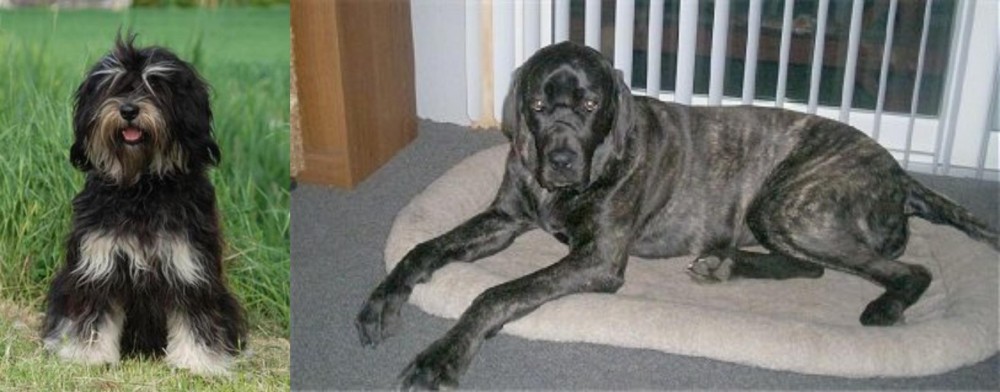 Cao da Serra de Aires is originated from Portugal but Giant Maso Mastiff is originated from Germany. Cao da Serra de Aires may grow 15 cm / 5 inches shorter than Giant Maso Mastiff. Cao da Serra de Aires may weigh 63 kg / 138 pounds lesser than Giant Maso Mastiff. Both Cao da Serra de Aires and Giant Maso Mastiff has almost same life span. Cao da Serra de Aires may have less litter size than Giant Maso Mastiff. Cao da Serra de Aires requires Moderate Maintenance. But Giant Maso Mastiff requires Low Maintenance
Cao da Serra de Aires is originated from Portugal but Giant Maso Mastiff is originated from Germany. Cao da Serra de Aires may grow 15 cm / 5 inches shorter than Giant Maso Mastiff. Cao da Serra de Aires may weigh 63 kg / 138 pounds lesser than Giant Maso Mastiff. Both Cao da Serra de Aires and Giant Maso Mastiff has almost same life span. Cao da Serra de Aires may have less litter size than Giant Maso Mastiff. Cao da Serra de Aires requires Moderate Maintenance. But Giant Maso Mastiff requires Low Maintenance
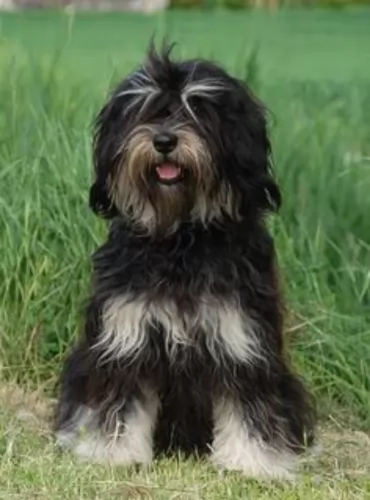 Ancestors of the Cao da Sera de Aires were used for herding livestock in the Serra de Aires and Alentejo, Portugal. This herding dog is native to Portugal and throughout the 20th Century he was kept as a working dog.
Ancestors of the Cao da Sera de Aires were used for herding livestock in the Serra de Aires and Alentejo, Portugal. This herding dog is native to Portugal and throughout the 20th Century he was kept as a working dog.
Known also as the Portuguese Sheepdog, Portuguese Shepherd Dog or Serra de Aires Mountain Dog, there are some questions surrounding the breed's ancestry as there are few records of dogs before 1900. The dog is thought to be related to the Pyrenean and Catalan Sheepdogs and that it has descended from Briards which were imported into Portugal and crossed with the Pyrenean Sheepdog.
The Cão da Serra de Aires breed standard was accepted by the Portuguese Kennel Club, and the breed was recognized internationally in 1996. The dog was also recognized by the United Kennel Club in the Herding Group in 2006.
 The Giant Maso Mastiff is a fairly new dog breed so you aren’t going to find much history on him.
The Giant Maso Mastiff is a fairly new dog breed so you aren’t going to find much history on him.
The breed was only started in 2001 so as to create a mastiff dog that would have fewer health problems and therefore have the chance to live longer. The Giant Maso came about because of a mix between the Old English Mastiff and the Cane Corso Italiano.
As stated, breeding began in 2001 and the dog has inherited intelligence and protective instincts from both these dogs.
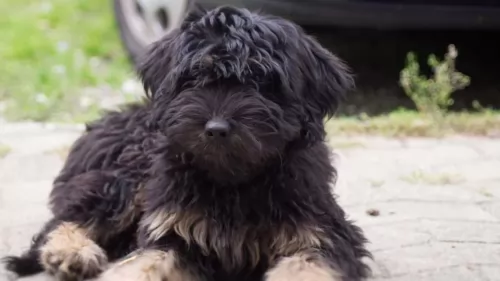 The beautiful Cão da Serra de Aires is a medium-sized dog. He stands at 45 to 55 cm at the withers and weighs about 17 to 27 kg. He is recognizable by the long, shaggy, single-layer coat, of straight or slightly wavy hair. Don’t be deceived by the coat as below, the dog has a muscular, athletic body.
The beautiful Cão da Serra de Aires is a medium-sized dog. He stands at 45 to 55 cm at the withers and weighs about 17 to 27 kg. He is recognizable by the long, shaggy, single-layer coat, of straight or slightly wavy hair. Don’t be deceived by the coat as below, the dog has a muscular, athletic body.
The coat comes in different shades such as fawn, gray, yellow and black. The dog has a long tail which is held straight out or down and he has medium-length, floppy ears. You’ve got to look hard, as the facial features of the dog are hidden by its shaggy coat. He has a lot of facial hair that sometimes you have to wonder if he can see out of his eyes.
The Cao da Serra de Aires is a wonderful canine companion and is devoted and loyal, forming strong bonds with their human family. He is a playful, amicable dog and gets on well with children in the home as well as with other pets.
He is intelligent and trainable, and when properly trained and socialized,he becomes an even nicer pet to have around and is obedient to his master’s voice. He is territorial, strong willed and dominant and makes a good watchdog too.
 The Giant Maso Mastiff is a large dog breed and can stand at between 67 to 70cm in height and weigh 60 to 90-kg.
The Giant Maso Mastiff is a large dog breed and can stand at between 67 to 70cm in height and weigh 60 to 90-kg.
He has a big square head with medium sized floppy ears and thick neck covered with loose skin. Muscular, he is a deep chested dog with powerful legs and long tail. The fur of the dog is short and sleek and can be a number of colors such as fawn, an apricot color, gray and black as well as brindle.
Intelligent, protective, self-confident, balanced and calm, the Giant Maso Mastiff may be quite an imposing looking dog but he is gentle-natured towards his family.
The large dog loves to please and receive praise from his human family. He is the perfect friend, getting on well with children in the home as well as with other dogs. Training and socialization is easy for this dog and it is important that he is trained if you want him to be an obedient pet.
He is gentle, intelligent, protective – simply known as a gentle giant, being calm, steady and amicable. This breed loves to please and needs lots of companionship from his human family, loving just to lie close by to them.
He isn’t a particularly active dog, but will still need to join you on a walk every day. It is why the Maso Mastiff can live in the city or in the countryside, because not being an overly active dog, he doesn’t need a large garden.
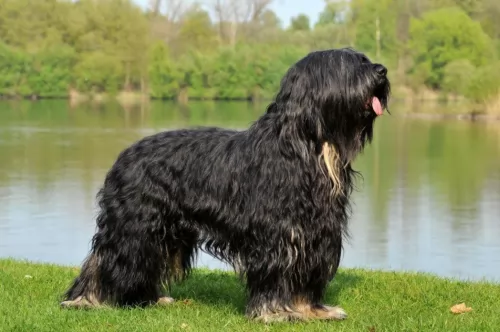 The Cão da Serra de Aires is such a loyal dog to his human family that he makes a splendid pet. He is active, having worked historically at herding and guarding.
The Cão da Serra de Aires is such a loyal dog to his human family that he makes a splendid pet. He is active, having worked historically at herding and guarding.
Socialization and obedience training ensure that he becomes an exceptional pet and he has a host of positive attributes to his name – he is intelligent, energetic, loyal and loving. He may have been used long ago to guard livestock, but today he is selected as a pet specifically for his excellent companionship and for his protective nature.
 Your Giant Maso Mastiff is such a gentle giant of a dog. He is well behaved and gentle so that it almost seems unnecessary to have him trained and socialized and yet doing so will make him even more amicable.
Your Giant Maso Mastiff is such a gentle giant of a dog. He is well behaved and gentle so that it almost seems unnecessary to have him trained and socialized and yet doing so will make him even more amicable.
Calm and gentle he makes the perfect pet for families where there are children as well as elderly people. He is quite frankly everyone’s friend, being a loving family pet. If you’re a family more into indoor games and TV watching than an outdoor, sporty kind of family, the Giant Maso Mastiff will suit you.
He will love to settle down and watch TV with you. He isn’t particularly active, although he will certainly need a walk every day.
Those who have owned a Giant Maso Mastiff will tell you that this is an excellent family pet, making a wonderful companion dog.
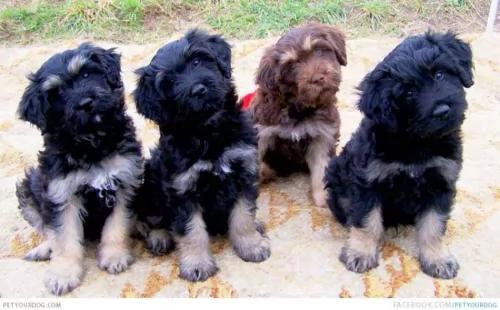 As with most dogs that are looked after well, their health can be good. The Cao da Serra de Aires isn’t likely to keep you at the vet often. Just like with any good dog, there are some health disorders that can benefit you to know about.
As with most dogs that are looked after well, their health can be good. The Cao da Serra de Aires isn’t likely to keep you at the vet often. Just like with any good dog, there are some health disorders that can benefit you to know about.
Being forewarned , you can get your pet to the vet quickly before the illness gets out of hand.
There are some pet owners who want to have their pets tested by the Orthopedic Foundation for Animals as well as the Canine Eye Registration Foundation to rule out health defects such as hip dysplasia and cataracts before they manifest themselves in their pets. This is of particular importance to breeders so as to prevent the parent dogs passing bad genetic conditions to the puppies.
This is a common skeletal disease where the dog’s hip joints don’t develop properly. It can be terribly painful for your pet to get around. It’s a genetic condition and while it is more prevalent in big dogs, any breeds are susceptible.
Your dog will battle along with painful joints and sometimes his hind-end will be lame. You’ll notice that once lying down, he battles to get up again. Fortunately vets are well acquainted with this ailment and they have different options to treat and manage it.
Cataracts in your dog come about from a disease process which affects the lens of the eye. The eye loses its transparency and impairs vision. There are some instances where cataracts can cause blindness. You’ll see a whitish gray area in your pets eye. The most common cause of cataracts is genetics. Get your pet to the vet who will do certain tests to evaluate the eyes and make a recommendation.
 There has always been the concern with joint disorders in large breed dogs. Both hip- and elbow dysplasia can occur with your Giant Maso Mastiff, more so if you overfeed him as a puppy and he grows too fast.
There has always been the concern with joint disorders in large breed dogs. Both hip- and elbow dysplasia can occur with your Giant Maso Mastiff, more so if you overfeed him as a puppy and he grows too fast.
With hip dysplasia, the long bone of the leg forms incorrectly. This can lead to pain and lameness with your pet.
Also check out bloat. This is a serious illness when the stomach fills with air and can twist. Gastric Dilatation-Volvolvus, is an emergency situation then which is found more often in large, deep-chested dog breeds.
If you see your dog with a bloated stomach and acting in a strange, lethargic way, get him to the vet immediately as bloat can be life threatening.
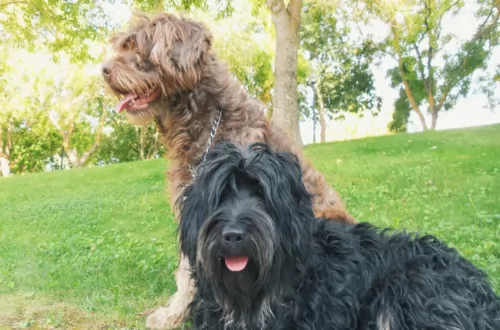 As a working dog used to long hours of action, the Cao da Serra de Aires will need lots of activity. He’ll need you taking him for long walks and playing ball games with him. He can become frustrated and destructive when left without any physical stimulation.
As a working dog used to long hours of action, the Cao da Serra de Aires will need lots of activity. He’ll need you taking him for long walks and playing ball games with him. He can become frustrated and destructive when left without any physical stimulation.
The Cao da Serra de Aires may have long hair but he isn’t high maintenance. He won’t require professional grooming, but will require a good brush a least twice a week. This is because the long coat can tangle.
To keep him looking his best, you’ll want to be trimming the hair around his paws. Another important grooming task is checking his ears and cleaning them. You have to be careful about cleaning your pet ears if you don’t know how, as it could damage the ears. Your vet can always advise you on how this is done.
 As an average shedder, the smooth, shorthaired coat is easy to groom, and a good brush twice a week will be adequate.
As an average shedder, the smooth, shorthaired coat is easy to groom, and a good brush twice a week will be adequate.
The Giant Maso Mastiff has floppy ears and therefore these should be checked for ear infections. Wax build up and dirt will need to be checked and cleaned.
His nails will need to be clipped, especially if they don’t wear down on their own and his teeth will need to be cleaned 2 or 3x a week to avoid dental disease.
With a large dog breed puppy such as the Giant Maso Mastiff, rapid growth is a risk factor for developing joint and bone conditions. The growth period can last till 12 months and puppies of large breeds should actually have their caloric intake adjusted during this growth period.
It is important to ensure that your puppy grows at a slow, steady rate. If you are feeding dog food from the commercially manufactured range, if you aren’t sure, speak to your vet about large breed dog foods. You want to be sure that this gentle giant of yours receives the best dog food there is, whether commercial branded dog food or your own home-made food. Good nutrition is imperative for the health of your pet.